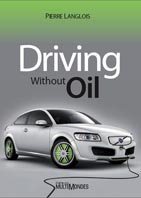
ILLUSTRATION - Number of years remaining before the exhaustion of resources at the global level, assuming a geological exploitation equal to that of 2006. The data come from the U.S. Geological Survey, the report BP Statistical Review of World Energy, June 2008 and an article by Paul Mobbs on reserves of uranium.
Even if cars with electric motorization are much more efficient than traditional cars, the fact remains that it is not very wise to constantly move a vehicle of 1500 kg (3,300 lbs) to carry a person of 75 kg (165 lbs). We must not only consider fuel consumption of vehicles. We will have to be very cautious also about the consumption of many metals that will disappear in a few decades, if we continue to exploit them at current rates (see chart above).
Given this finding on resources, the author of these notes is convinced that true sustainable development of road transport requires a very large investment in public transit, our governments have a duty to improve it, to attract more customers. Carpooling and urban community-electric cars are also very important to help us eliminate our dependence on oil while reducing consumption of raw materials. Cycling and walking complement well these ecological transport means. But we will also have to rethink suburban sprawl, promote 4-day working weeks, when possible, and telecommuting.
To minimize the consumption of raw materials in vehicle construction as such, the wheel-motor powertrain is the one that allows the greatest economy, as we shall see in another note. Besides the wheel-motors are ideal for urban transit, as they allow the bus to recover the maximum amount of energy during their many stops, which minimizes power consumption. In fact, buses are probably the vehicles that would benefit most from the wheel-motors technology.





No comments:
Post a Comment